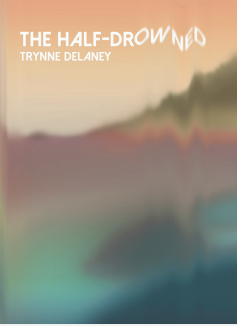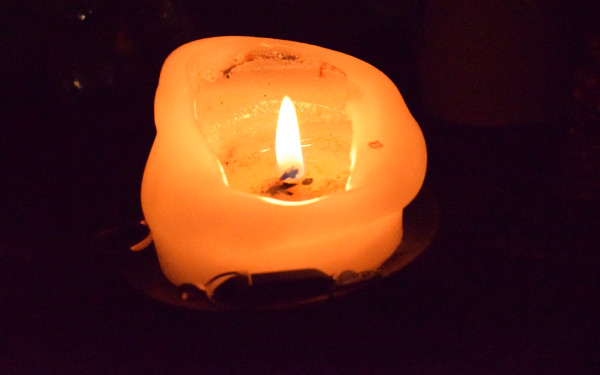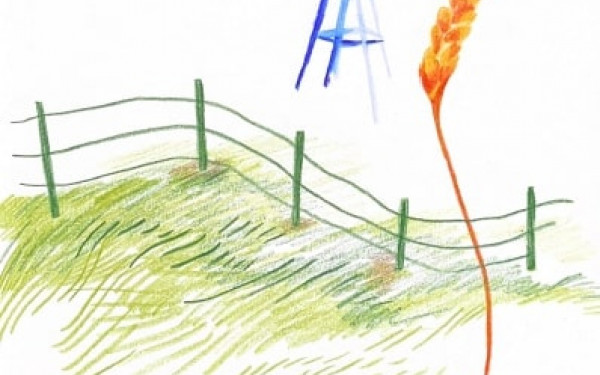the half-drowned: A Soaring Spec-Fic Debut
Trynne Delaney Dwells on Belonging, Bodies, and Black Trauma in the Post-Apocalypse
the half-drowned is a speculative fiction novella by Trynne Delaney that tackles themes of belonging, bodies, and the legacy of Black trauma. Published on June 1, 2022, by Metatron Press, the work is the Montréal-based writer’s first book.
Delaney, who holds a Master of Arts degree from the University of Calgary in English Literature and Creative Writing, has experimented with these themes before. Their resume includes a creative thesis, poems, and even interactive games that explore climate change and Black diasporic experiences. the half-drowned, then, represents a kind of evolution of these endeavours.
Set along the Fundy coast—a backdrop presumably inspired by the author’s Maritime upbringing—the half-drowned’s characters inhabit a settlement populated by Black climate refugees. Apparently, these are the sole survivors of an environmental decay which has driven much of Earth’s population offworld, poisoned the rain, and left its oceans littered with wires and plastic. If that doesn’t make community building hard enough, an annual plague–known colloquially as the “Dying Season”–continues to rip apart families, lovers and friends.
In the face of such bleak circumstances, central siblings Harbour and LaVon navigate what it means to belong within a family, between lovers and as part of a community. A romance plotline pits Harbour’s desire for a broader understanding of her society—and, by extension, her brother—against the bond she shares with ex-lover Kaya. The progression to this arc is satisfying, avoiding melodrama and cliché thanks in large part to Delaney’s searingly intimate prose. This thread serves as a kind of spine to the story, binding together the discussions on personal and ancestral connections.
“This is not a history lesson,” the novel opens, and yet the legacy of historic traumas such as slavery haunt its narrative. The irony of a predominantly Black community finally holding dominion over North America is not lost on the opening chapter’s unnamed narrator:
“We became stolen people on stolen land. And so we stayed when everyone who could left for the sky…Finally, we had the invitation to live on this land, in peace and friendship like we never did before on this purgatorial plane.,” mentions the narrator. These continual nods to injustices against Black cultures lend the independent community described within the half-drowned a sense of weight. Despite facing environmental catastrophe, the settlement’s older residents rejoice in the simple freedoms afforded by their isolated way of life. At the novella’s close, the surviving characters are left with the one thing they started out with: each other, and this in itself is a victory of sorts.
Curiously, despite shaping the main setting, environmentalism takes a back seat to these discussed themes. Though the decaying world is brilliantly evoked, the author gives no sermons against the use of plastics or for the importance of reforestation—no hope that this kind of catastrophe could be avoided. A decision which, perhaps, makes the novella all the more terrifying. For Delaney, environmental collapse is already a grim reality; it just hasn’t quite caught up with us yet.
Throughout the novella, Delaney employs a hybrid writing style that blends the poetic with the prosaic. Slick and precise, much of their worldbuilding is delivered in sparse, colloquial dialogue, or through the oral testimony of characters and first-person narration: “Backintheday people took our tradition and sold it back to us. And then, the world ended and we ended up out here alone, those of us who couldn’t flee the flood. We thrived.” This allows the half-drowned to avoid many of science-fiction’s trappings, notably the cliché of overdetailed environmental illustrations.
While the prose never falters in quality, this dreamy, skeletal style can have mixed impacts on the story’s narrative. Key scenes are often rendered murky, and the action within them can come off as unclear. Notably, the mechanics and presence of the novel’s antagonist—a visitor from offworld—remain intangible even after several read-throughs. While Delaney’s decision not to hold readers’ hands is respectable, this results in a narrative climax that sacrifices some of its emotional payoff for the complexity of solving a puzzle.
Despite this enigmatic ending, the novella resonates long after its closing pages. Delaney has conjured up a startlingly bleak, frighteningly plausible world in which the value of belonging to a greater whole is emphasized—but also interrogated—under new light. Their prose forges startlingly concrete images, ensuring the text lingers with readers as if it were a nightmare from which one isn’t sure they’ve fully awakened.







